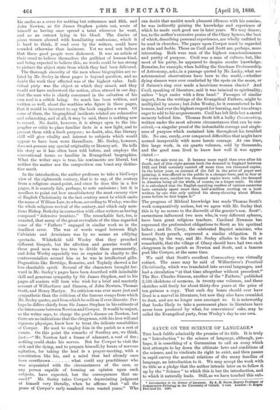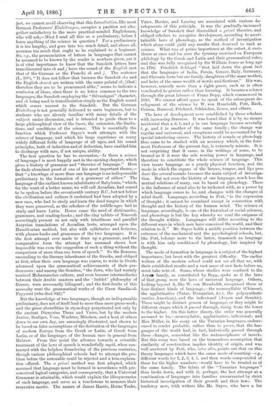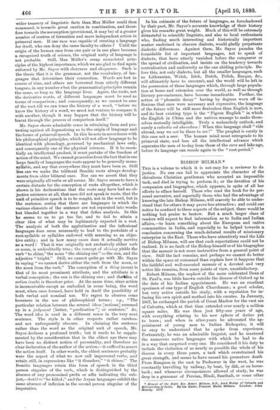SAYCE ON THE SCIENCE OF LANGUAGE.* Tam book fulfils admirably
the promise of its title. It is truly an " Introduction " to the science of language, although, per- haps, it is something of a Germanism to call an essay which first attempts to lay down the ultimate laws and conditions of the science, and to vindicate its right to exist, and then passes in rapid survey the mutual relations of the many families of language, an introduction to it. We may accept the work with its title as a pledge that the author intends later on to follow it up by the" Science" to which this is but the introduction, and to which it naturally leads. Still, as we have touched this sub-
* Introduction to the Science of Language. By A. H. Sayce, Deputy Professor ot Comparative Philology in the University of Oxford. 2 vols. London: 0. Kogan Paul and Co. 1880. ject, we cannot avoid observing that this Introduction, like most German Professors' Einleitungen, occupies a position not alto- gether satisfactory to the more practical-minded Englishman, who will ask,—Must I read all this as a preliminary, before I learn anything of the science in question F For a preliminary it is too lengthy, and goes into too much detail, and above all, assumes too much that ought to be explained to a beginner. So, e.g., the pronunciation of letters in languages that cannot be assumed to be known by the reader is nowhere given, yet it is of vital importance to know that the Sanskrit letters here transliterated into a and j have the sound of the English (not that of the German or the French) ch, and j. The sentence (I., 309), "It does not follow that because the Sanskrit dm and the English church are written with the same palatal A, [that] therefore they are to be pronounced alike," seems to indicate a confusion of ideas, since there is no letter common to the two languages, the Sanskrit employing the "D6vanigari " character, and ch being used in transliteration simply as the English sound which comes nearest to the Sanskrit. But the German Bin/a/wig is not generally delivered to mere beginners, but to students who are already familiar with many details of the subject under discussion, and is intended to guide them to a large philosophical view of the bases, the extension, the limita- tions, and conditions of the science. This is essentially the function which Professor Sayce's work attempts with the science of language, and which his large experience on many widely different fields of language of all ages, and his sound principles, both of induction and of deduction, have enabled him to discharge with rare, if not unique, ability.
The first question he has to encounter,—Is there a science of language P is most happily met in the opening chapter, which gives a history of grammar and "theories of language." Here he finds abundant proof of one of his most important theses,— that " a knowlege of more than one language is an indispensable preliminary to the formation of a grammar of either." The language of the earliest known inhabitants of Babylonia," which, for the want of a better name, we will call Accadian, had ceased to be spoken before the seventeenth century B.C., but not before the civilisation and culture it enshrined had been adopted by a new race, who had to study and learn the dead tongue in which they were preserved, as the scholars of the middle-ages had to study and learn Latin. Hence came the need of dictionaries, grammars, and reading-books ; and the clay tablets of Nineveh accordingly.- present us not only with interlinear and parallel Assyrian translations of Accadian texts, arranged upon the Hamiltonian method, but also with syllabaries and lexicons, with phrase-books and grammars of the two languages. It is the first attempt ever made to draw up a grammar, and the comparative form the attempt has assumed shows how impossible was even the suggestion of such a thing without the comparison of more than one form of speech." So the Romans, succeeding to the literary inheritance of the Greeks, and obliged at first, when their own language was coarse, to write in Greek, advanced upon the grammatical achievements of their pre- decessors; and among the Semites, "the Jews, who had warmly received Mohammedan culture, and even become intermediaries between their Arabic masters and the 'Infidel' philosophy of Greece, were necessarily bilingual ; and the first-fruits of this necessity were the grammatical works of the Gaon Saadia-el- Fayyumi (who died 942)."
But the knowledge of two languages, though an indispensable preliminary, does not of itself lead to more than mere guess-work; and the gross absurdities in etymology perpetrated not only by the ancient Dionysins Thrax and Varro, but by the modern Junius, Scaliger, Voss, Wachter, Minshen, and a host of others down to our own day, are amusingly illustrated, and shown to be based on false assumptions of the derivation of the languages of modern Europe from the Greek or Latin, of Greek from Latin, or of the languages of the human race in general from Hebrew. From this point the advance towards a scientific treatment of the laws of speech is wonderfully rapid, when con- trasted with the helpless floundering of the previous centuries, though various philosophical schools had to attempt the pro- blem before the untenable could be rejected and a true explana- tion offered. The a priori method was first adopted, which assumed that language must be formed in accordance with pre- conceived logical categories, and consequently, that a Universal Grammar is attainable, which would explain the idiosyncracies of each language, and serve as a touchstone to measure their respective merits. The names of James Harris, Horne Tooke,
Vater, Herder, and Lessing are associated with various de- velopments of this principle. It was the gradually-increased knowledge of Sanskrit that discredited a priori theories, and obliged scholars to recognise development, according to ascer- tainable laws of phonology, as the method of investigation which alone could yield any results that deserved to rank as science. What was of prime importance at the outset, it over- threw at once and for ever the tyranny exercised on European philology by the Greek and Latin and their grammatical rules,. and this was fully recognised by Sir William Jones as long ago as 1786. Friedrich Schlegel "first laid down the great fact that the languages of India, Persia, Greece, Italy, Germany, and Slavonia form but one family, daughters of the same mother,. and heirs of the same wealth of words and flections." His was, however, scarcely more than a right- guess, such as is often vouchsafed to genius rather than learning. It became a science- through the great labours of Franz Bopp, which commenced in 1816. We cannot afford space to speak of the subsequent de- velopment of the science by W. von Humboldt, Pott, Bask,. Grimm, Burnouf, Prichard, Schleicher, Zeuss, and others.
The laws of development were established by these scholars with increasing firmness. It was found that it is by no means accidental that a d, 1,, and g in one language became severally 1, p, and k in another of the same family ; the change was regular and universal, and exceptions could be accounted for by special interfering causes. The history of sounds or phonology thus came to be studied with an accuracy which, in the fore- most Professors of the present day, is extremely minute. It is not surprising that it came, in the writings of some, to be treated as if it were the sole moving power in language, and therefore to constitute the whole science of language. This view treats language as a purely physical function, and the mode in which the organs of the larynx, tongue, and lips pro- duce the several sounds becomes the main subject of investiga- tion. But not even the history of one language, much less the mutual relations of many, can be based on phonology. There is the influence of mind also to be reckoned with, as a power by which language comes to be, and changes with the changes of mind itself. Language, according to Pott, "is the expression of thought ; it cannot be examined except in connection with thought and the history of the human mind. The science of language, accordingly, is one of the historical or social sciences, and phonology is but the key whereby we read the enigmas of the thought within. Languages will differ according to the different ways in which men have conceived the world, and their relation to it." Mr. Sayce holds a middle position between the extremes of the mechanical and the pyschological schools, but, like Pott, belongs more to the latter, inasmuch as language is with him only conditioned by phonology, but inspired by thought.
The mode of formation in language is a subject of the highest importance, but beset with the greatest difficulty. The earlier writers of the modern school could not see all that we, with their established results and a vast mass of new facts before us, must take note of. Some, whose studies were confined to the Aryae family, as constituted by Bopp, spoke as if the laws of that group were the laws of universal language. Others, looking beyond it, like W. von Humboldt, recognised three or four distinct kinds of language,—the monosyllabic (Chinese), the agglutinative (Tatar, Hungarian, cVc.), the polysynthetic (native American), and the inflexional (Aryan and Semitic). These might be distinct genera of language, or they might be
different stages which it passed through, rising from the lower to the higher. On this latter theory, the order was generally assumed to be,—monosyllabic, agglutinative, inflexional; and Max Miller, in his essay on the Turanian languages, endeav- oured to render probable, rather than to prove, that the lan- guages of the world had, in fact, historically passed through
these changes, somewhat like the metamorphoses of insects. But this essay was based on the tremendous assumption that similarity of construction implies identity of origin, and was
well answered by Pott, who, inter alio, points out that on this theory languages which have the same mode of counting—e.g., different words for 1, 2, 3, 4, 5, and then words compounded of
these for the higher numbers—would have to be treated as of
the same family. The fabric of the "Turanian lauguages " thus broke down, and with it, perhaps, the last attempt at a
combination of languages into families unwarranted by strict historical investigation of their growth and their laws. The tendency now, with writers like Mr. Sayce, who have a far wider treasury of linguistic facts than Max Muller could then command, is towards great caution in combination, and there- fore towards the assumption (provisional, it may be) of a greater number of centres of formation and more independent action in primeval men. If one race was capable of creating a language for itself, who can deny the same faculty to others P Until the origin of the human race from one pair or in one place becomes a recognised truth of science, the original unity of language is not probable. Still, Max Miller's essay enunciated prin- ciples of the highest importance, which we are glad to find again enforced by Mr. Sayce with clearness and eloquence. Such is the thesis that it is the grammar, not the vocabulary, of lan- guages that determines their connection. Words are lost in course of time, and others are borrowed from utterly different tongues, in any number r but the grammatical principles remain the same, so long as the language lives. Again, the roots, not the derivative words, of different languages must be used as -terms of comparison ; and consequently, as we cannot be sure of the root till we can trace the history of a word, "before we know the history of a word, we must not venture to compare it with another, though it may happen that the history will be learnt through the process of comparison itself."
Mr. Sayce shows admirable sense in refraining from and pro- testing against all dogmatising as to the origin of language and the forms of primeval speech. In this he acts in accordance with his philosophical principles, which will not allow language to be identical with phonology, governed by mechanical laws only, and consequently one of the physical sciences. If it be essen- tially an intellectual product, it must partake of the freedom of action of the mind. We cannot generalise from the fact that in one large family of languages the roots appear to be generally mono- syllabic, and say that everywhere they must have been so. Still less can we make the triliteral Semitic roots always develop- ments from older biliteral ones. Nor can we assert that they were originally all verbs or all nouns. Mr. Sayce seems to have a certain distaste for the conception of roots altogether, which is shown in his declarations that the roots may have had no ob- jective existence at all, that men did not speak in roots, that the unit of primitive speech is to be sought, not in the word, but in the sentence, seeing that there are languages in which the various elements of the sentence are not separated into words, but blended together in a way that defies analysis. In this lie seems to us to go too far, and to fail to attain a clear idea of what may be legitimately expected in a root. The analysis of both the agglutinative and the inflexional languages does seem necessarily to lead to the postulate of a root-syllable or syllables endowed with meaning as an objec- tive entity; and in how many cases does it actually survive as a word ! That it was originally not exclusively either verb or noun, is undoubtedly true ; the concept of shining yields the verb "to shine," the noun "the shining one "= the sun, and the adjective "bright." Still, we cannot quite go with Mr. Sayce in saying "we cannot derive either the verb from the noun, or the noun from the verb." The conception of a thing (noun) is that of its most prominent attribute, and the attribute is a verbal conception ; the sun is the shining one ; and theft/idea of action (verb) is therefore prior. At the same time, since action is inconceivable except as embodied in some being, the word must, when once formed, have held in itself the possibility of both verbal and nominal use. We regret to observe some looseness in the use of philosophical terms ; e.g., "The particular relation between the several ideas [notions] summed up in a jadgin,ent [better, "predication "3 or sentence," ecc. The word idea is used in a different sense in the very next
sentence. The style is in other respects rather careless, and not unfrequently obscure. In claiming the sentence rather than the word as the original unit of speech, Mr.
Sayce declares a profound truth ; but it needs to be supple- mented by the consideration that in the oldest age there may have been no distinct notion of personality, and therefore no clear declaration of the author of the action,—it sufficed to assert the action itself. In other words, the oldest sentences probably wore the aspect of what we now call impersonal verbs, and retain still, in expressions like "it thunders," "it shines." The Semitic languages retain this form of speech in the third person singular of the verb,, which is distinguished by the
absence of any pronominal prefix or affix indicating the sub- ject,—katcil="he killed;" and the Aryan languages exhibit the same absence of inflexion in the second person singular of the imperative. In his estimate of the future of languages, as foreshadowed by their past, Mr. Sayce's accurate knowledge of their history gives his remarks great weight. Much of this will be extremely distasteful to scientific linguists, and also to local enthusiasts who, finding much interesting and historically important matter enshrined in obscure dialects, would gladly perpetuate dialectic differences. Against them, Mr. Sayce parades the formidable list of important languages, not to speak of dialects, that have utterly vanished before the conqueror or the spread of civilisation, and insists on the tendency towards centralisation and uniformity as the one abiding principle. Be- fore this, not only dialects, but all the smaller languages, such as Lithuanian, Welsh, Irish, Dutch, Polish, Basque, Ace., will ultimately have to succumb, and the world will be left in the possession of those languages which, through large popula- tion at home and extension over the world, as well as through literary pre-eminence, have become ineradicable. Further, the action of "phonetic decay" having by degrees worn off in- flexions that once were necessary and expressive, the language of the future will be still more flexionless than English is now, and its best existing type is the "Pigeon English" in which the English in China and the natives manage to make them- selves mutually intelligible. Truly a melancholy outlook, and surely a reductio ad absurdum. ! When this language shall "ride abroad, may we not be there to see !" The prophet is surely in this case not a seer. The human mind must retrograde to its primeval state, and lose all the intellectual advance which separates the men of to-day from those of the cave and lake age, before its language can recede again to the "root-period."




































 Previous page
Previous page